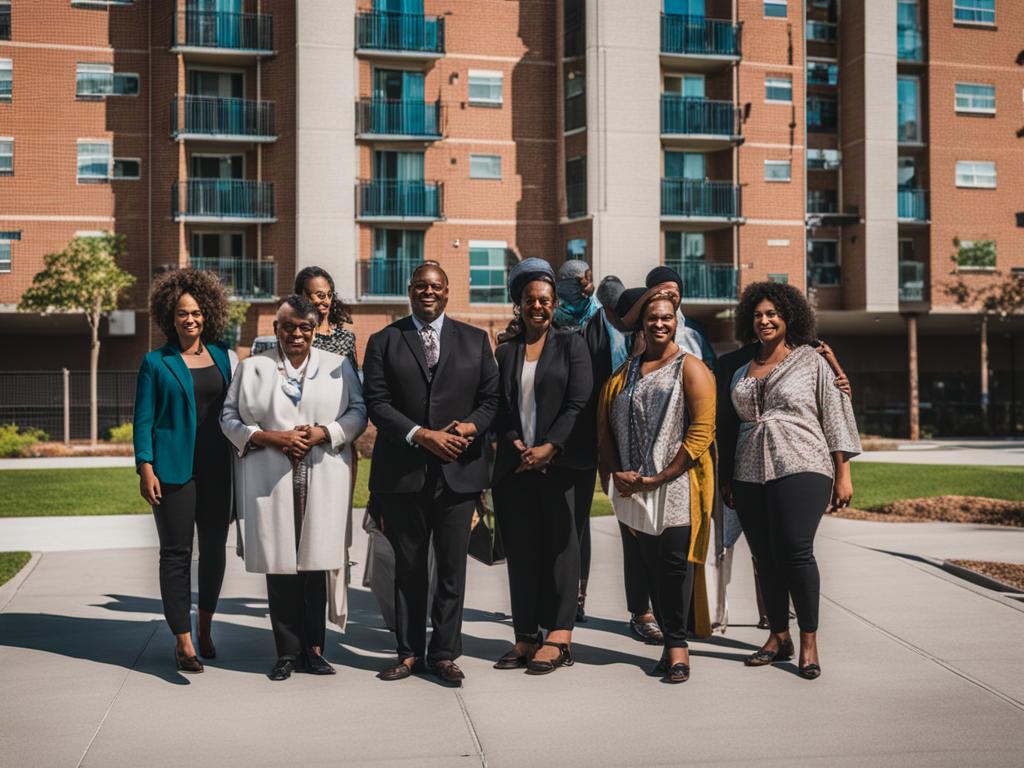Empowering Voices: Tenants and Residents Association
Welcome to the world of tenant associations, where residents come together to address common issues and concerns in their rental properties. A tenants and residents association, also known as a resident association or tenant association, is a community organization that empowers residents to advocate for themselves and improve their living conditions.
By educating themselves and their members about their legal rights and responsibilities, tenant associations equip residents with the knowledge they need to navigate the complexities of renting. They can provide valuable information about local laws and regulations pertaining to rent, security deposits, repairs, evictions, and discrimination.
But tenant associations offer much more than just legal guidance. They also play a crucial role in communicating and negotiating with landlords on behalf of their members. Whether it’s raising issues or complaints, requesting repairs or improvements, or proposing changes or solutions, tenant associations use their collective power to ensure that residents’ voices are heard and their concerns are addressed.
Furthermore, tenant associations foster a sense of community and solidarity among residents. They organize events, workshops, and newsletters to encourage interaction, socialization, and networking, creating a supportive environment where residents can connect with and support one another. Additionally, tenant associations often collaborate with other community organizations and movements, amplifying their impact and working towards shared goals of social justice and community development.
Key Takeaways:
- Tenant associations empower residents to advocate for themselves and improve their living conditions.
- They educate residents about their legal rights and responsibilities as renters.
- Tenant associations communicate and negotiate with landlords on behalf of their members.
- They foster community and solidarity among residents through events and networking opportunities.
- Tenant associations collaborate with other organizations and movements to amplify their impact.
Identifying Rights and Responsibilities
Tenant associations have a vital role in empowering residents by educating them about their legal rights and responsibilities as renters. Understanding and being aware of your rights is crucial in ensuring a fair and positive rental experience. By educating yourself, you can navigate the complexities of local laws and regulations with confidence.
As a renter, it’s essential to familiarize yourself with the laws regarding rent, security deposits, repairs, evictions, and discrimination in your jurisdiction. These laws can vary from one locality to another, so it’s crucial to be knowledgeable about the specific regulations that apply to your area.
Tenant associations can provide valuable resources and support in helping you gather information and navigate the legal landscape. By joining a tenant association, you can access the collective knowledge and expertise of other members, as well as tap into the resources available through local tenant organizations, legal aid services, or housing agencies.
Understanding Local Laws
Here are some key areas commonly covered by local rental laws:
- Rent Control: Regulations governing the amount and frequency of rent increases
- Security Deposits: Guidelines for the collection, use, and return of security deposits
- Repairs and Maintenance: Responsibilities of landlords and tenants in ensuring habitable living conditions
- Evictions: Procedures and requirements for eviction, including notice periods and legal grounds
- Discrimination: Laws prohibiting discrimination based on protected characteristics such as race, gender, or disability
By familiarizing yourself with these local laws and regulations, you can effectively advocate for your rights and protect yourself against any potential violations. Knowledge is power, and being informed about your rights and responsibilities as a renter empowers you to assert them confidently.
Remember, tenant associations can play a significant role in educating their members about local laws and regulations. By collaborating with your fellow renters and sharing resources, you can create a supportive environment that helps everyone understand their rights and responsibilities as tenants.
| Tenant Rights | Responsibilities |
|---|---|
| Right to Safe and Habitable Housing | Maintaining cleanliness and not damaging the property |
| Right to Quiet Enjoyment | Respecting other tenants’ right to peaceful living |
| Right to Privacy | Allowing landlords to access the property for necessary inspections and repairs |
| Right to Non-Discrimination | Preventing discrimination based on race, gender, religion, or other protected characteristics |
| Right to Reasonable Notice | Providing proper notice before entering or making changes to the property |
Communicating and Negotiating with Landlords
Tenant associations have a crucial role in advocating for their members by effectively communicating and negotiating with landlords. By leveraging their collective power and voice, tenant associations can address issues, raise complaints, and initiate conversations that lead to positive changes in rental properties.
When it comes to addressing issues, tenant associations have various strategies at their disposal. Firstly, documenting problems is essential to provide clear evidence of the issues faced by residents. This documentation strengthens the tenants’ case and allows them to present their concerns in a well-supported manner. Collecting evidence can include taking photographs, recording videos, or keeping records of written communication with the landlord.
Writing letters is another effective method for communicating with landlords. A well-crafted letter can outline the issues or complaints, provide evidence, and propose solutions or requests for repairs and improvements. The letter should be concise, professional, and address the specific problems faced by the tenants.
“A well-crafted letter can outline the issues or complaints, provide evidence, and propose solutions or requests for repairs and improvements.”
In addition to letter writing, tenant associations can also hold meetings with landlords to discuss the concerns and find common ground. These meetings provide an opportunity for tenants to express their views, negotiate solutions, and collaborate towards a resolution. The presence of multiple tenants and their collective demands adds weight to their requests.
Furthermore, tenant associations have the option to organize petitions or protests to apply pressure on landlords for prompt action. Petitions can demonstrate the widespread support and urgency of the tenants’ demands, while protests can attract media attention and generate public awareness about the issues faced by the residents.
As tenant associations communicate and negotiate with landlords, it is crucial to maintain a professional and respectful approach. By clearly articulate the issues, propose responsible solutions, and emphasize the collective power of tenants, negotiation becomes more effective and productive.
Example: Tenant Association Achievements
Let’s take a look at the achievements of “ResideRise,” a tenant association in the city of Springfield:
| Issue | Achievement |
|---|---|
| Unresolved Repairs | After documenting the extensive repairs needed in their building, ResideRise successfully negotiated with the landlord, resulting in a comprehensive repair plan within a reasonable timeframe. |
| Inadequate Security | ResideRise organized a petition, garnering the support of all tenants in their building, to pressure the landlord into improving security measures. This led to the installation of security cameras and enhanced building access control systems. |
| Rent Increase | Through strategic negotiation and collective bargaining, ResideRise successfully convinced their landlord to freeze rent increases for the next two years, providing relief to all tenants. |

By effectively communicating and negotiating with landlords, tenant associations wield collective power and influence to improve the living conditions and address the concerns of their members. Let’s explore the next section to understand the role of tenant associations in building community and solidarity.
Building Community and Solidarity
Tenant associations play a vital role in empowering residents by building a sense of community and solidarity among them. By fostering interaction, socialization, and networking, tenant associations create opportunities for tenants to connect and support one another. Through various events, workshops, and newsletters, tenant associations facilitate engagement and collaboration among residents, enhancing their collective strength and impact.
The Power of Interaction
One of the key benefits of tenant associations is the promotion of interaction among residents. Through regular meetings, members have the chance to meet their neighbors, share experiences, and discuss common challenges. This interaction fosters a sense of belonging and connection, creating a supportive and inclusive community environment.
Socialize and Network
Tenant associations organize social events where residents can come together to socialize and network. These events provide a platform for tenants to form meaningful relationships, exchange ideas, and collaborate on common goals. Whether it’s a potluck dinner, a community picnic, or a movie night, these gatherings strengthen bonds and encourage collaboration.
Workshops and Skill-Building
Another way tenant associations foster community is through workshops and skill-building activities. They offer educational sessions on various topics of interest to residents, such as tenant rights, financial literacy, home maintenance, and community organizing. By equipping residents with knowledge and skills, tenant associations empower them to take an active role in shaping their living environment and advocating for their needs.
Newsletters for Information Sharing
Tenant associations also utilize newsletters as a means of communication and information sharing. These newsletters keep residents informed about association activities, upcoming events, important updates, and relevant resources. They serve as a valuable source of information, fostering awareness and engagement among members.
“Tenant associations provide residents with a platform to connect, share, and collaborate, which leads to a stronger sense of community and solidarity.”
Collaboration and Collective Impact
Tenant associations have the power to collaborate with other tenant groups, community organizations, and movements. By joining forces, they can amplify their impact and advocate for broader change. Through collaborative efforts, tenant associations can address systemic issues, influence policy decisions, and promote social justice in housing.
By building community and solidarity, tenant associations create a supportive and empowering environment for residents. Through interaction, socialization, networking, workshops, newsletters, and collaboration, they promote unity and collective action to address common concerns and improve the overall well-being of tenants.
Developing Skills and Leadership
Tenant associations play a vital role in empowering residents by fostering the development of essential skills and leadership abilities. They offer various opportunities for training, mentoring, and coaching in areas such as organizing, communication, negotiation, and understanding legal issues. By equipping residents with these valuable skills, tenant associations enable them to effectively navigate the complexities of advocating for their rights and addressing common concerns.
One way tenant associations support skill development is through training programs. These programs provide residents with the knowledge and practical know-how to effectively organize their communities and effectively voice their concerns. Training sessions cover a wide range of topics, including community organizing techniques, conflict resolution strategies, and understanding tenants‘ legal rights. Residents gain valuable insights and tools that enable them to take an active role in shaping their living conditions.
“The strength of a tenant association lies in its people. By investing in the development of skills and leadership abilities, tenant associations empower individuals to become effective advocates for their community.”
In addition to training, tenant associations facilitate mentoring and coaching relationships. Experienced members of the association, often those who have held leadership roles, provide guidance and support to newer members. Mentors offer advice, share their experiences, and help mentees navigate the challenges they may encounter. This mentorship fosters leadership development and enables residents to become confident advocates for their rights.
Tenant associations also encourage their members to take on various roles and responsibilities within the group. This involvement provides opportunities for residents to enhance their leadership abilities and develop new skills. Whether it’s serving as a committee chair, organizing events, or leading community outreach efforts, these responsibilities give individuals the chance to apply their newly acquired knowledge and contribute to the collective goals of the association.

Creating Positive Change
Tenant associations have the power to create positive change in rental properties and beyond. By addressing various aspects of housing, tenant associations strive to improve housing quality, affordability, safety, relationships, services, and amenities. Additionally, tenant associations contribute to the broader goals of tenant rights, social justice, and community development.
Improving housing quality is a key objective of tenant associations. By advocating for repairs, maintenance, and necessary upgrades, tenant associations ensure that residents live in safe and habitable conditions. This includes demanding timely repairs of plumbing, electrical, and structural issues to prevent further damage and maintain a comfortable living environment.
Affordability is another crucial focus for tenant associations. They work towards keeping rental prices affordable, preventing unjustified rent increases and protecting tenants from being priced out of their homes. Tenant associations may also negotiate with landlords to introduce rent control policies or increase financial assistance programs to assist those struggling with housing costs.
Safety is a top priority for tenant associations. They actively address security concerns by advocating for improved lighting, secure entry systems, and effective maintenance of safety equipment, such as fire alarms and sprinkler systems. Tenant associations also work to create safe environments by highlighting and fighting against discriminatory practices or harassment experienced by residents.
Tenant associations understand the importance of building strong relationships within the community. By organizing events, fostering communication, and promoting mutual support, they enhance the sense of community among residents. This creates a supportive network where neighbors can rely on each other for help, creating a stronger and more cohesive community.
Furthermore, tenant associations focus on improving services and amenities for residents. Whether it’s advocating for better public transportation access, community centers, or recreational facilities, tenant associations work to enhance the overall living experience for residents. They strive to ensure that essential services, such as water, electricity, and sanitation, are of high quality and accessible to all.
Tenant associations play a crucial role in safeguarding tenant rights. They provide information and resources to educate residents about their rights, enabling them to assert themselves in disputes with landlords. Tenant associations may also collaborate with legal aid organizations to offer free or low-cost legal assistance to tenants facing eviction or lease-related issues.
Moreover, tenant associations are deeply committed to social justice and community development. They actively support initiatives that address systemic inequalities in housing, such as advocating for affordable housing policies, combating discrimination, and promoting equitable access to housing opportunities for marginalized communities.
Together, tenant associations form a powerful force for positive change. By bringing tenants together, advocating for their rights, addressing housing issues, and championing social justice, tenant associations are instrumental in creating thriving communities where everyone can enjoy safe, affordable, and dignified housing.

Tenant Unions and Their Role in Housing Affordability
Tenant unions play a crucial role in addressing housing affordability and advocating for the rights of renters. These collective organizations are formed by tenants with the aim of fighting for their interests in the housing market. By joining together, tenants can leverage their collective bargaining power to bring about positive change.
One of the key ways tenant unions address housing affordability is by educating renters about their rights and responsibilities. Through workshops, training sessions, and informational resources, tenant unions empower individuals with knowledge about tenant laws, regulations, and available resources. This tenant education helps renters navigate housing issues and make informed decisions.
Tenant unions also advocate for policy change at the local, state, and national levels. They work to influence legislation and housing policies that impact affordability, rent control, tenant rights, and fair housing practices. Through lobbying efforts, organizing campaigns, and public awareness initiatives, tenant unions strive to create a more equitable and affordable housing landscape for all.
Building Community and Addressing Power Imbalances
Community building is another important aspect of tenant unions. These organizations foster a sense of solidarity among renters by organizing events, workshops, and mutual support networks. By bringing tenants together, tenant unions promote collaboration and create a platform for collective action.
Furthermore, tenant unions address power imbalances between landlords and tenants. They provide a voice to renters who may otherwise face challenges when dealing with landlords or property management companies. Through negotiation and collective advocacy, tenant unions strive to ensure that the rights and interests of renters are protected and respected.
Overall, tenant unions contribute to the fight for housing affordability by empowering tenants, advocating for policy change, building community, and addressing power imbalances. By joining together, renters can create a powerful force that can bring about positive change in the rental market.

| Tenant Unions and Housing Affordability | Key Benefits |
|---|---|
| Collective Bargaining Power | Tenant unions empower renters by providing collective bargaining power, allowing them to negotiate for fair rent, improved housing conditions, and protections against unjust eviction. |
| Tenant Education | Tenant unions educate renters about their rights and responsibilities, equipping them with the knowledge to navigate housing issues, assert their rights, and make informed decisions. |
| Policy Change | Tenant unions advocate for policy change at the local, state, and national levels, working to influence legislation that improves housing affordability, tenant protections, and fair housing practices. |
| Community Building | Tenant unions foster a sense of community among renters through events, workshops, and mutual support networks, enabling individuals to connect, share experiences, and collaborate for greater impact. |
| Addressing Power Imbalances | Tenant unions strive to address power imbalances between landlords and tenants, ensuring that renters have a voice and representation in housing decisions and disputes. |
Conclusion
Tenant associations and tenant unions, such as residents’ associations, community associations, and tenant councils, play a crucial role in empowering residents and addressing common issues in rental properties. By educating themselves about their rights and responsibilities, tenants can assert their legal protections and navigate the complexities of the rental market.
Through effective communication and negotiation with landlords, tenant associations provide a unified voice for residents, raising concerns, requesting repairs, and advocating for improvements. By building community and solidarity, tenants can create a supportive network, foster social connections, and work collaboratively towards common goals.
Tenant associations also focus on developing skills and leadership among their members, providing training and resources to enhance organizing, communication, and negotiation abilities. This enables tenants to effectively advocate for their rights and make a positive impact on their living conditions.
Ultimately, tenant associations and tenant unions contribute to creating positive change not only within rental properties but also in the broader housing landscape. By uniting their voices, tenants strengthen their communities and strive for safe, secure, and affordable housing for all.
FAQ
What is a tenant association?
A tenant association is a group of residents who organize to address common issues and concerns in their rental properties. They aim to educate themselves and their members about their legal rights and responsibilities, communicate and negotiate with landlords, build community and solidarity, develop skills and leadership, and create positive change in their rental properties and beyond.
How can a tenant association empower residents?
Tenant associations can empower residents by educating themselves and their members about their legal rights and responsibilities as renters. They can also communicate and negotiate with landlords on behalf of their members, build community and solidarity among residents, develop their skills and leadership abilities, and work towards creating positive change in their rental properties and beyond.
What resources can tenant associations access?
Tenant associations can access resources and support from local tenant organizations, legal aid, or housing agencies to gather information, advice, or representation. These resources can provide valuable guidance on legal issues, tenant rights, and responsibilities, and help tenants navigate challenging situations with their landlords.
How can tenant associations communicate and negotiate with landlords?
Tenant associations can raise issues or complaints, request repairs or improvements, and propose changes or solutions to landlords. They can leverage strategies such as documenting problems, collecting evidence, writing letters, holding meetings, and organizing petitions or protests to pressure landlords to respond or comply.
What benefits does building community and solidarity offer?
Building community and solidarity among residents through tenant associations creates opportunities for tenants to interact, socialize, and network. Events, workshops, and newsletters provide avenues for residents to connect and support each other. Collaboration with other tenant groups, community organizations, or movements can amplify the impact and influence of the tenant association.
How do tenant associations develop skills and leadership?
Tenant associations offer training, mentoring, and coaching on organizing, communication, negotiation, and legal issues. They encourage and support their members to take on roles and responsibilities within the group or outside of it, fostering skill development and leadership growth among residents.
What positive change can tenant associations create?
Tenant associations work towards improving housing quality, affordability, and safety in their rental properties. They also aim to build better relationships, services, and amenities for residents. Additionally, tenant associations contribute to broader goals of tenant rights, social justice, and community development.
What is the role of tenant unions in housing affordability?
Tenant unions are collective organizations formed by renters to advocate for their rights and interests in the housing market. They address housing affordability by providing collective bargaining power, educating renters, advocating for policy change, building community, and addressing power imbalances between landlords and tenants.

